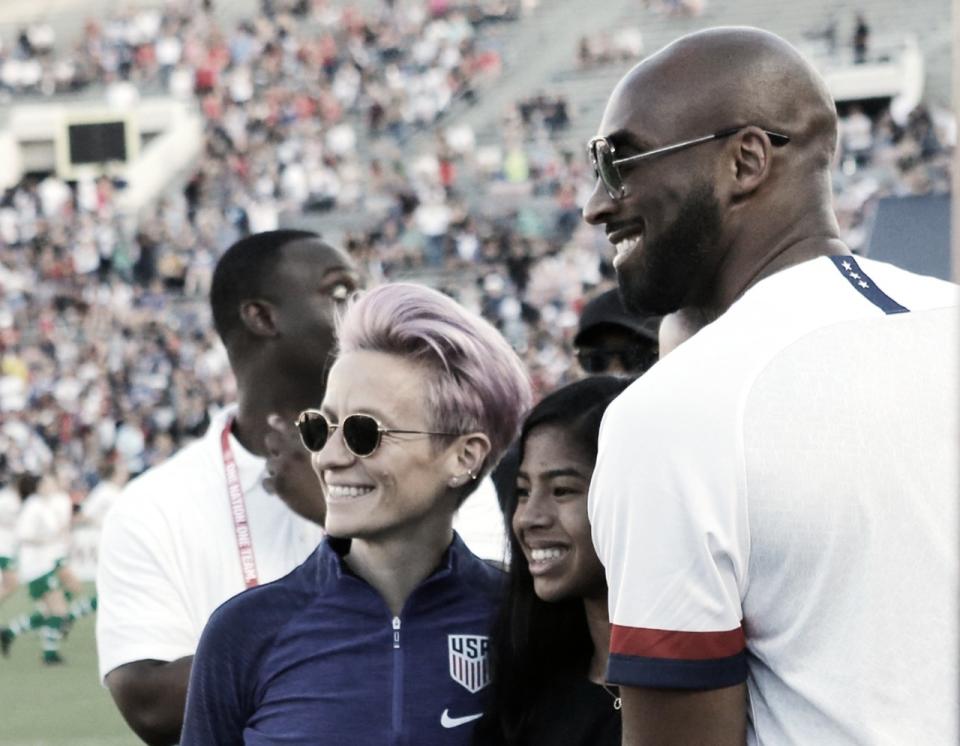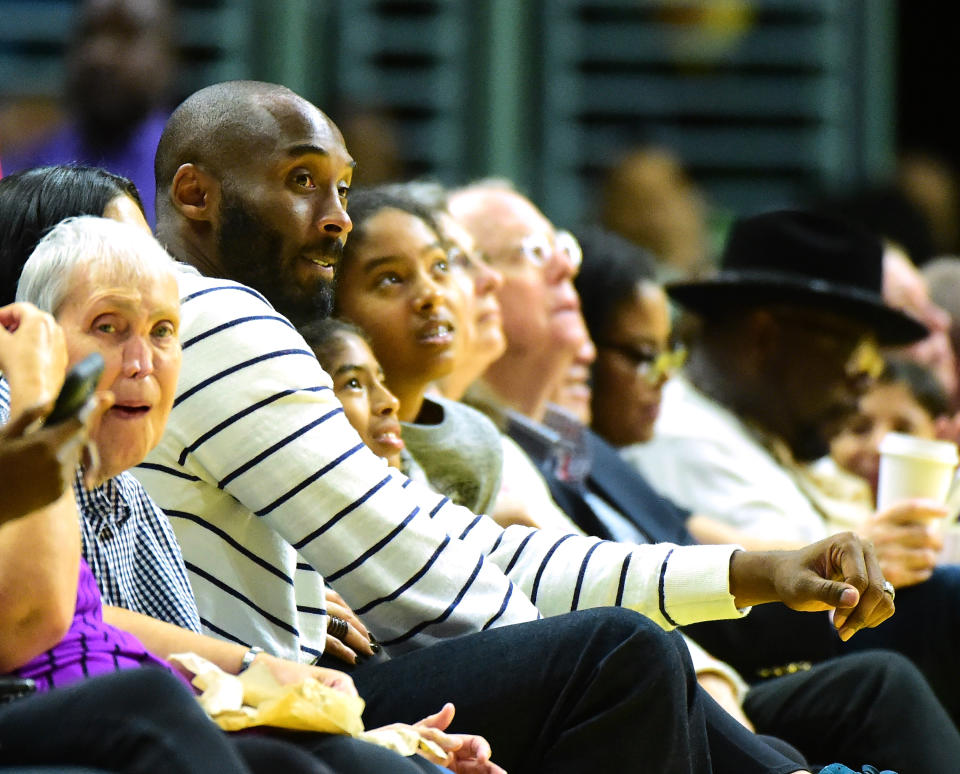On Kobe Bryant's complicated legacy as a champion for women's sports

Fans of women’s sports were familiar with Kobe Bryant, even if they didn’t follow his 18-time All-Star career with the Los Angeles Lakers or witness the five NBA championships he won.
Bryant was a fixture at WNBA games, often sitting courtside with his daughter, Gianna. He appeared in ads for the WNBA and NCAA women’s basketball, and increasingly used his presence on social media to promote the game. When people told him he needed to have a son to continue his basketball legacy, Bryant said Gigi was going to handle that.
He was also a big fan of the U.S. women’s soccer team, and his support appeared genuine. He didn’t just attach himself to the world’s most popular women’s soccer team after it won a World Cup and otherwise ignored it. He stayed connected and mentored players.
But remembering Bryant, whose life was tragically cut short Sunday in a helicopter crash along with Gigi and seven others, as some sort of feminist hero wouldn’t quite be the full truth.
Supporting women’s sports is only part of Kobe Bryant’s story
In the middle of his NBA glory, and after he had only just recently become a father, Bryant was accused of raping a 19-year-old woman who worked at a hotel he was staying at in Colorado.
The evidence in the assault case was enough for Bryant to be formally charged and for prosecutors to pursue a conviction. The accuser, whose identity had been revealed by Bryant’s legal team, and who faced character attacks and backlash, eventually stopped cooperating with prosecutors, and the case was dismissed.
Afterward, Bryant released a statement negotiated between the lawyers.
“I want to apologize directly to the young woman involved in this incident,” he said. “I want to apologize to her for my behavior that night and for the consequences she has suffered in the past year. Although this year has been incredibly difficult for me personally, I can only imagine the pain she has had to endure.
“Although I truly believe this encounter between us was consensual,” the statement continued, “I recognize now that she did not and does not view this incident the same way I did. After months of reviewing discovery, listening to her attorney, and even her testimony in person, I now understand how she feels that she did not consent to this encounter.”
A civil case proceeded and was settled out of court, where legal experts speculate Bryant paid millions. At best, his words hinted at the sort of regret one might spend the rest of his life trying to rectify.
Bryant would eventually have three more daughters, four total, and would seemingly not only embrace being a good father to them, but trying to make the world a better place for them. It seemed as if he wanted his daughters to have the same career opportunities he did, and that helped nudge him to cheer on the WNBA and the USWNT as enthusiastically as he did.
And, as the memories of the accusations against him faded into the past, those athletes embraced him for it.
Kobe’s support for the USWNT, WNBA
Former USWNT striker Sydney Leroux first met Bryant because his young daughters were fans of hers. Before she made the 2015 World Cup roster, Bryant would frequently offer advice.
He texted Leroux in the fall of 2014: “Question I want you to think about in detail: Why are you going to be great and how are you going to get there?” That was the sort of message he sent her regularly, and she later went on to win the World Cup with the USWNT in Canada.
Bryant once expressed annoyance that people constantly asked when the United States would win a World Cup, as if the men’s team was the only one that counts.
“It’s like, aye, homie, we’ve done it.’” Bryant said. “The World Cup is here."

When the USWNT fought against FIFA’s decision to play the 2015 Women’s World Cup on artificial turf, he was among the celebrities who chimed in, offering support and amplifying the issue.
He called the USWNT “great examples of role models for black girls.” Of the WNBA, he said last year: “There’s no better way to learn than to watch the pros do it. The WNBA is a beautiful game to watch.”
His support wasn’t perfect. Just last week he was criticized for saying some WNBA players could compete in the NBA. He meant it as a compliment, but it came off as suggesting the WNBA was inherently inferior to the NBA.
But Bryant did what many of his contemporaries haven’t done, using his platform to promote and elevate female athletes.
As WNBA legend Rebecca Lobo put it after his shocking death: “No NBA player supported the WNBA or women’s college basketball more than Kobe. He attended games, watched on TV, coached the next generation.”
How will Kobe’s support for women’s sports be remembered?
Bryant’s advocacy on behalf of women in recent years certainly doesn’t absolve him of whatever transpired in Colorado. And it’s a shame that now we will probably never hear him elaborate on the lessons he learned from that dark chapter, because at the time, long before the #MeToo movement, almost everyone was eager to move on from it as quickly as possible. Bryant was never truly forced to reckon with his transgression in Colorado beyond the legal proceedings, and now we are left trying to figure out how it fits into his legacy.
Yet, Bryant’s death leaves a void where one of the world’s most famous male athletes regularly and enthusiastically supported female athletes. As complicated and untidy as his legacy may be, there is now one fewer voice talking about the WNBA, the USWNT and other female athletes as equals.
Indeed, the passing of Bryant is devastating for his family and fans of the NBA, but it’s also a loss for women’s sports. It’s complicated, but so is life.
Caitlin Murray is a contributor to Yahoo Sports and her book about the U.S. women’s national team, The National Team: The Inside Story of the Women Who Changed Soccer, is out now. Follow her on Twitter @caitlinmurr.
More from Yahoo Sports:

 Yahoo Finance
Yahoo Finance 